Live Reporting
- A female passenger in her 70s who caught the virus on a cruise ship which docked in Sydney last Thursday has died in hospital this morning, health officials say.She was one of the first three cases confirmed on the ship last Friday, and had been taken to hospital immediately after disembarking.About 2,700 passengers were allowed off the ship last week, with many flying overseas, not knowing there were confirmed virus cases on board. This has sparked huge public criticism.
- We know that many people are contracting the coronavirus around the world, but establishing a death rate is no simple task.The World Health Organization says about 3.4% of all cases have resulted in deaths, but scientists estimate that the death rate is actually much lower because many cases have mild symptoms and are not reported.The rate of fatalities also depends on a range of factors including age, sex, pre-existing conditions and the health system you are in.From the evidence available, we know that some groups of people are more likely to die if they contract the virus - the elderly, the unwell and, maybe, men.
- Cuba has now closed its doors to all tourists, and those that are already in the country will have to go into quarantine.There were on Monday around 32,500 overseas tourists in Cuba - of which 9,400 were staying in homestays. The government says they will be moved to state-run hotels to complete their quarantine, according to Reuters,They won't be let out of quarantine until they find a flight home - though many flights have already been cancelled. - so its likely many will find themselves stranded.Cubans themselves also cannot leave the island without authorisation.There are currently 40 confirmed cases in Cuba.
- As people across the world stay at home amid the coronavirus crisis, some are putting their Christmas lights up to help spread a little bit of joy.Claire and Danny Marsh, from Corby in the UK, are currently self-isolating with their two children and say they wanted to "make people smile" in a time of "doom and gloom".The couple have already received an anonymous donation of £50 through their door, which they plan to pass on to a local food bank.The idea also seems to have taken off in the US:
- As the outbreak spreads, we've been inundated with questions from around the world about the coronavirus and measures that can be taken to reduce the risk of transmission. Our science reporter Victoria Gill has answered some of them.Abdul Karim in Sierra Leone: What is the main cause of coronavirus?Victoria: That’s a big question because actually there are millions and potentially billions of coronaviruses that exist in the wild. What scientists think happened is that animals being kept in very unsanitary conditions and close confines - perhaps in a marketplace in China - were shedding a lot of the virus, maybe in urine, faeces and blood. Researchers think that the original host could have been a bat and that at some point, possibly in one of these wildlife markets, the spill over into humans happened.Mustafa in Iraq: I live in Iraq which suffers from poor health infrastructure. What drugs do I need if I’m infected by Covid-19? Is there any update on the vaccine?Victoria: Unfortunately there is no approved anti-viral that will actually tackle, cure and kill this virus, but progress has been unbelievably quick. So just a few days ago the World Health Organization launched a massive clinical trial testing basically the four lead candidates' anti-viral drugs that could potentially be used to treat this.Abdul in Zanzibar: I would like to ask about wearing masks because there has been huge confusion here in my country.Victoria: There isn't good evidence that wearing a mask will protect you from being infected as you go about everyday life. The mask itself could still become contaminated, so if you touch it - take it on and off - and then touch your face, that would still cause infection.There's good evidence though that it prevents you from passing the infection on.But it's very important that supplies of protective masks are kept for our frontline health workers. So really what people should do if they have any of the symptoms is to self-isolate and stay indoors.
- President Trump has been accused of putting the nation's economic wellbeing ahead of its public health after pledging on Monday: "America will again and soon be open for business."With about 44,000 cases and 557 deaths, the US now has the third highest number of cases in the world, behind Italy and China.Half of America's total caseload is in New York state, which has recorded more than 20,000 positive tests and 157 deaths.As the president hinted that he was inclined to ease restrictions, state by state the nation was tightening lockdown measures.On Monday, Washington, Ohio, Louisiana, Oregon, Michigan, Indiana and Massachusetts Monday became the latest to issue "stay at home" orders for residents.Wisconsin and New Mexico will follow suit on Tuesday, taking the total number of states withdrawing behind closed doors to well over a dozen.As these orders go into effect, about one in three Americans - more than 100 million people - will be required to restrict their movements.US National Guard troops are helping distribute food and medical supplies across the country.The homeland military force's leader, General Joseph Lengyel, described the situation as like having "54 different hurricanes hitting every state".
- Until now, Myanmar - the South East Asian country with a population of more than 50 million - was the most populous country without any confirmed cases.It has now reported its first two cases - Myanmar nationals who had recently travelled to the United States and the United Kingdom.The news of the confirmed cases sparked panic buying in the commercial capital of Yangon.Myanmar last week closed land borders and banned mass gatherings, including for the upcoming Buddhist New Year.Government spokesman Zaw Htay told a news conference earlier this month that the "lifestyle and diet of Myanmar citizens" had protected the country against the virus.
- In New Zealand, UK nationals have told the BBC they're struggling to get out as the nation plunged into lockdown yesterday.Flights have been cancelled and major transit hubs shut under the restrictions.In response, Lara Suleyman, from Kent, put out a public plea on Facebook reaching out to other stranded UK nationals, and urging UK authorities to help with flights - and perhaps even a repatriation effort.Close to 1,000 other British nationals have now registered their details on a public 'Get Us Home UK' database organised by Lara, who is sharing the details with the UK consulate in NZ.She says she's been contacted by students, people on working holidays, tourists facing eviction from their hotel room and "doctors and nurses who want to get back to the NHS and help out"."Basically, in the last 24 hours, almost every transit hub between NZ and the UK has shut down," she told me."There's a lot of people that are really wanting to get home and just feel completely abandoned right now."
- Hundreds of Central Asian migrant workers are stuck in limbo at Moscow airports after Russia's borders were closed to contain the spread of the coronavirus.Over the past few days, social media has been flooded with photos of people sleeping on floors and chairs, as flights have been cancelled - often unrefunded - and migrant workers have no money to pay rent or buy food.Hundreds of thousands of people travel to Russia each year for work. Many would usually return home at the end of the winter season, as their work permits expire. Others are now trying to leave, nervous about the Covid-19 pandemic.But Valentina Chupik, from Tong Jahoni - an NGO that helps migrants - worries that camping out in close proximity at airports could make things worse. "I think they can really receive corona there," she says.Charter flights are slowly being organised from Moscow, though seats are scarce and tickets expensive - and more migrants are reported stranded across the country. The Uzbek embassy has offered hostel rooms, too, but many don’t dare go and miss a flight. "They prefer to stay [at the airport] day and night…and wait for a miracle," Ms Chupik says.
- More than 16,500 people with Covid-19 have died around the world. The places with the most deaths are:
- Italy: 6,077
- Hubei province, China: 3,153
- Spain: 2,311
- Iran: 1,812
- France: 860
- United States: 515
- United Kingdom: 335
- Netherlands: 213
- Germany: 123
- Switzerland: 120
Source: Johns Hopkins University - Wuhan, the centre of the coronavirus outbreak in China, confirmed a new virus case on Wednesday - ending a five day run with no new cases.It comes as the city finally began loosening restrictions after more than two months in lockdown.Authorities say there were 78 new confirmed cases over the last 24 hours - 74 of which were imported from abroad.This means there are today four new domestic cases across China, including the one in Wuhan.
- There have been 378,601 confirmed cases of Covid-19 around the world. Here are the ten most-affected countries:
- China: 81,948
- Italy: 63,927
- United States: 43,901
- Spain: 35,136
- Germany: 29,056
- Iran: 23,049
- France: 20,123
- South Korea: 8,961
- Switzerland: 8,795
- United Kingdom: 6,726
Source: Johns Hopkins University - The US - in the midst of its own virus outbreak - has now backed growing international demands for the 2020 Tokyo Olympics to be postponed.The US Olympic & Paralympic Committee said an overwhelming majority of American athletes backed the move. It follows Canada's announcement on Sunday that it would not send athletes to the Games.The pressure on the International Olympic Committee has spiked in the last 24 hours. It says it has given itself four weeks to decide whether or not the Games should go ahead.Meanwhile in Japan, people still queue - at the requisite 1m distance apart - to see the flame as it makes its uncertain way across the country.
- Here's a quick snapshot:
- Less than a day into a national shutdown, a minister says welfare agencies are "literally [seeing] hundreds and hundreds of thousands, maybe a million people, unemployed overnight"
- Government Services Minister Stuart Robert has also apologised for the My.gov.au financial assistance website crashing, admitting he had underestimated demand - calling it "my bad"
- New South Wales is in a "critical stage" as cases there nudge towards 1,000, says Premier Gladys Berejiklian
- Football's A-League competition has been postponed, following similar calls by the Australian Football League (AFL) and National Rugby League (NRL) in the past 48 hours
- Tasmania has urged all non-Tasmanians to stay away from the island state.
- Referring to the unprecedented shutdown of businesses across the country, President Trump said: “We can’t have the cure be worse than the problem.”He claimed that if closures stretched on for months, it would cause "far bigger problems” than the coronavirus itself. He added that the war against the pandemic would be won much sooner than people think.Health experts have warned that unless Americans continue dramatically to limit their social interactions the number of infections will overwhelm the health care system.
- For a while there, it looked as if New Zealand just might have escaped the virus spread but it too has seen rising numbers and it has just announced 40 more, taking the total of confirmed and probable cases to 155. But there have been no deaths.Last week, the country closed its borders to everyone but returning citizens and residents as further daily restrictions set in for the country.
- As the UK follows much of Europe by ordering people to stay at home, the situation in parts of Asia is not quite as severe.
- In Hong Kong, people have been encouraged to use "social distancing" and to stay at home "as far as possible". Work places remain open but people have been urged to "work from home if feasible", avoid social gatherings, and stay away from crowded places
- In Singapore- where we are writing from - life is continuing largely as normal. People are being urged to stay one metre apart, temperature checks are common, and gatherings of more than 250 people are banned. But, like Hong Kong, there are very strict border restrictions
- Taiwan also has relatively mild restrictions for residents, although border restrictions are in place. Organisers of large gatherings have been asked to "reassess the necessity" of their events, and people who are ill have been urged to stay at home
- South Korea appears to have passed its peak of cases, but recently announced "strengthened measures", by asking people to avoid social gatherings and trips. Libraries, swimming pools, and museums are closed, but most work places are open - although people have asked to work from home where possible
- With concerns about how stretched hospitals are going to cope, carmakers are answering calls from governments to help make more ventilators and masks.On Monday Fiat began converting one of its car plants in China to making surgical masks. The carmaker wants to start production in the coming weeks, wrote its chief executive Mike Manley in an email.Other major automakers are looking at ways they can shift manufacturing towards ventilators. General Motors, Ford and Tesla in the US have all pledged their support to offer resources to make more ventilators, along with Japanese carmaker Nissan and Formula 1 teams in the UK.
- Chinese media are reporting the latest numbers from 23 March. It's 78 new cases on the Chinese mainland, with 74 of them imported.This echoes the pattern of recent days and what we have seen is that most of those imported cases tended to come from the UK and the US.

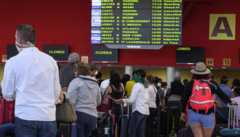




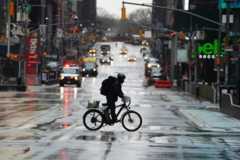
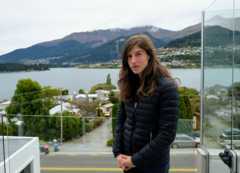

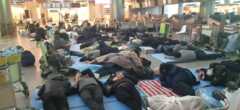
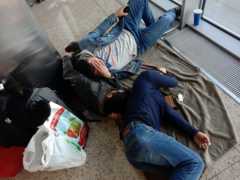

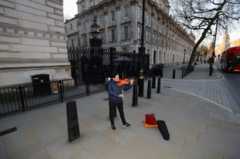
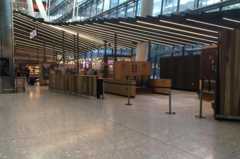
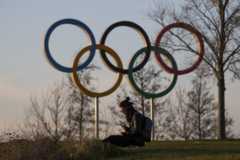
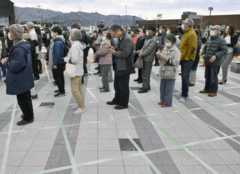
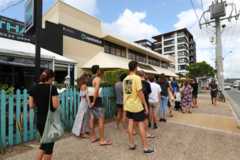
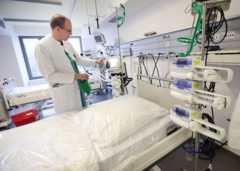
No comments:
Post a Comment